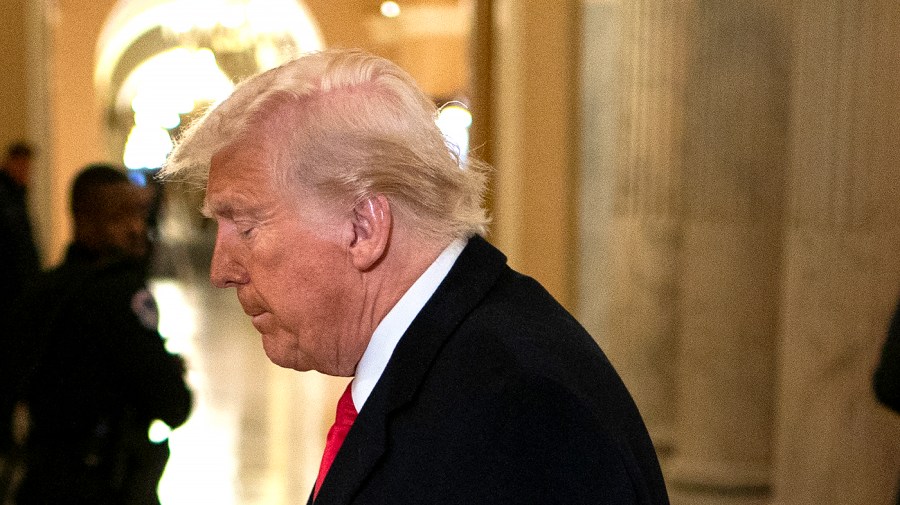
Federal judges are curbing President Trump’s sweeping directives to reshape the government, issuing a flurry of rulings blocking his agenda from charging forward.
More than three dozen lawsuits have been filed challenging major Trump administration actions from gender to immigration to federal employee protections.
Many of the plaintiffs sought speedy relief and warned of imminent harm, leading to an extravaganza of emergency hearings this week in courtrooms across the country.
“The environment that exists right now within the administration and the political appointees — from whatever it is now to tomorrow morning might as well be an eternity for us,” Mark Zaid, an attorney for FBI agents who worked on Jan. 6 cases suing to block the release of their names, said at a hearing this week.
Trump has signed dozens of executive actions since returning to the Oval Office last month, flooding the zone with orders and statements zigzagging through different policy areas.
Those directives have drawn swift legal challenges, filling judges’ calendars across the country — especially in Washington, D.C., where more than 20 new suits have brought the federal courthouse’s halls and courtroom galleries back to life after weeks of little action. Federal judges in Washington scheduled hearings in eight different lawsuits this week alone.
The change in administration has also brought a change in favorable venues. Many cases have been filed along the coasts in places like Seattle, Boston, and Maryland, a shift from when Republican-led challenges to the Biden administration were regularly filed in Texas and Missouri.
Though many of Trump’s actions have faced challenges, none has come under as much legal scrutiny as his order restricting birthright citizenship for children born on U.S. soil to parents in the country illegally.
Judges have excoriated the administration this week as they blocked it nationwide under the 14th Amendment.
“No court in the country has ever endorsed the president’s interpretation. This court will not be the first,” U.S. District Judge Deborah Boardman, a Biden appointee, said Wednesday as she blocked the order.
The next day, a Reagan-appointed federal judge went as far to accuse Trump of ignoring the rule of law as the judge again blocked his order.
“The rule of law is, according to him, something to navigate around or simply ignore, whether that be for political or personal gain. Nevertheless, in this courtroom and under my watch, the rule of law is a bright beacon,” said U.S. District Judge John Coughenour.
Late Thursday, the Justice Department commenced its appeal of Coughenour’s ruling, marking the first time an appeals court will weigh in on one of Trump’s executive actions.
Beyond the birthright citizenship order, which faces nine lawsuits, judges have also moved to block some of his moves on pausing federal funding and gender.
A federal judge this week universally blocked Trump’s order mandating that transgender women in federal prison be moved to men’s facilities and the government stop paying for their gender-affirming care.
And it came only after a federal judge in Rhode Island blocked the Trump administration’s widespread federal funding pause, though lawyers for several states who sued indicated Thursday that the administration may not be fully abiding by the order.
Other cases are moving in that direction.
For nearly six hours Thursday, a federal judge in Washington, D.C. mediated discussions between the government and lawyers for 16 FBI agents who worked on Jan. 6 cases, who sued over the possibility of their names being publicized. A hearing over whether to temporarily block the government from doing so is expected to resume Friday, unless the parties reached an agreement beforehand.
A federal judge in Massachusetts on Thursday also pushed back the deadline for federal workers to accept Trump’s sweeping buyout offer, as the court is set to weigh the merits of the bid to block the “deferred resignation” program Monday.
The deluge of challenges has thrown Trump’s Justice Department into the deep end.
“Daniel, I can only imagine how busy you and your office are these days, just from reading the press,” U.S. District Judge John McConnell, who oversees the Rhode Island case, told Justice Department attorney Daniel Schwei Thursday. “And I know the states are as well, and they come from far and wide.”
When Schwei appeared in a different case this week, U.S. District Judge Loren AliKhan told the DOJ lawyer she hoped she did not “ruin your Saturday” by establishing a weekend deadline.
“But this is important,” AliKhan said.
Many legal experts believe some of the cases are ultimately destined for the Supreme Court, where Trump appointed three justices during his first term to cement the court’s 6-3 conservative majority.
But as the lawsuits trudge through the trial courts, the justices have been focused elsewhere.
Justice Ketanji Brown Jackson this week is at an event in the U.S. Virgin Islands. Justice Clarence Thomas has become the go-to official to swear in many of Trump’s nominees across the Washington area. Justice Sonia Sotomayor Wednesday was in Louisville, Ky., to accept an award.
But the question remains as to which case will reach the justices first — and when?









